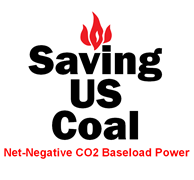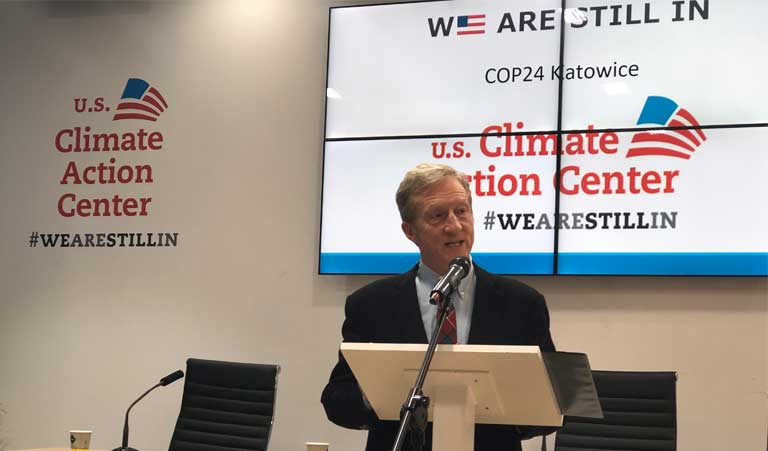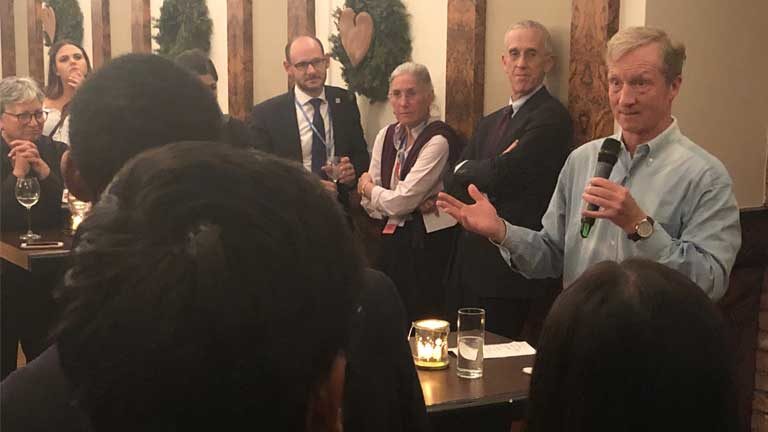
 






.gif)



|
Signature Sponsor


December 11, 2018 - Three years ago in Paris, the U.S. delegation was instrumental in drafting thousands of words that ultimately became one of the most significant agreements ever to be approved by all nations on earth: the Paris Agreement on climate change.
Saturday, at the end of the first week of negotiations at the 24th United Nations climate summit, or COP24, a very different U.S. delegation played a leading role involving just one word, emphasizing the Trump Administration’s hostility toward climate action in all forms.
The U.S., along with oil producing allies Russia, Saudi Arabia and Kuwait, have succeeded, so far, in blocking broad consensus that would fully acknowledge the gravity of the landmark October report by the UN’s International Panel on Climate Change (IPCC). That document, agreed to by the world’s top scientists, warns that climate conditions are far worse than previously realized, with time running out for nations to act to curb carbon emissions and prevent disastrous global warming.
Saturday, in a heated meeting of delegates representing large and small nations, negotiators argued over one word regarding the required acceptance of the IPCC’s so called “1.5 degree report,” which warns that nations have just 12 years to act to prevent some of the worst impacts of climate change.
The Maldives, a South Asian island country threatened by sea level rise, urged a revision of original language reading that countries “noted” the IPCC report, to saying they “welcomed” it.
“Urgency has been ignored by many in the room,” the Maldives representative asserted. “What signal does that send to the world? We insist that we ‘welcome’ the report of the IPCC.”
The European Union, Norway, New Zealand, Costa Rica, Colombia and a host of others agreed to the more emphatic wording. A representative from the United States did not. He said the U.S. “appreciated the work” of IPCC scientists, but no revision was necessary. Russia agreed. So did Saudi Arabia and Kuwait.
Nations vulnerable to climate change were aghast at the U.S.-led pushback. “If there is anything ludicrous to this discussion it’s that we as this body are not in a position to ‘welcome’ this report,” said the delegate from St. Kitts, another island state.
Lacking consensus, the Maldives recommendation to “welcome” the IPCC report fizzled and the original language was retained.
“Whether to ‘note’ or to ‘welcome’ this report may seem like a trivial matter, but it translates into how this document is to be perceived by decision makers,” said Alden Meyer of the Union of Concerned Scientists in a Monday press conference. “There is no doubt that this report is having an impact here, and these four countries themselves cannot block its acceptance. It will be up to the negotiators this week to resolve this issue over how to receive the report.”
With just five days left to approve the Paris accord rulebook and other critical financial matters, some representatives fear more U.S., Russian and Saudi roadblocks this week, as the most critical part of COP24 gets underway with national leaders who have decision-making or breaking authority arrive on the scene, replacing bureaucrats in the talks.
The Failure to Lead
At a private COP24 event Saturday night, Todd Stern, President Obama’s lead climate adviser for seven years and instrumental to the Paris Agreement, lamented the loss of U.S. leadership: “You cannot underestimate the negative impact of the U.S. being on the sidelines. With Obama, the U.S. had credibility. We brought China along. We moved a lot of countries out of their comfort zones. That’s all missing now.”
Since Trump’s 2016 election, no national leader or coalition of leadership has emerged to fill the void left by the U.S. – influence seen as vital if nearly 200 nations are to work cooperatively and avoid climate catastrophe.
Here in Katowice, Tom Steyer, one of America’s most prominent environmental activists and among the wealthiest, declared that “nothing short of transformational politics” in the U.S. will get international climate action back on track.
Steyer insisted only the United States has the political and economic clout to serve in that leadership role, even as a growing coalition of subnationals – mayors, governors, businesses, faith leaders and NGOs – generate a surge in U.S. and international climate action. It’s not enough, he concluded.
Without U.S. leadership, Steyer said, the world’s largest carbon polluters will continue to deny, and even undermine, aggressive climate action, as they have since the 1990s, first with the Kyoto Agreement, now potentially with implementation of the Paris Agreement. Alarmingly, global greenhouse gas emissions hit record highs in 2018, for the second consecutive year, accelerating like a “speeding freight train,” according to scientists. Climate disasters around the globe have escalated as well.
“There is a framework here for action,” Steyer told Mongabay on Friday at the opening of the U.S. Climate Center at COP24; for the second year, the center is backed by U.S. mayors, governors and business leaders, not the federal government. “But how do you push the framework? It doesn’t happen without the U.S. It simply doesn’t happen.
“So until we get the U.S. back in the game, there is no fair, honest broker to push things forward. There is no replacement for the U.S. to do the right thing. First, we need to do the right thing ourselves, then we can pressure everyone else to do the right thing.”
Of course, such a dramatic sea change is at least 2 years – and the 2020 U.S. election – in the future. Most climate experts stress that the world cannot afford more delay.
U.S. environmental activist Tom Steyer, founder of NextGen America, tells a crowd at the U.S. Climate Center on Friday that only political change in Washington can get global climate action back on track. Photo by Justin Catanoso, Mongabay
Youth for Climate Action
Until a lead nation steps forward, the work of subnationals and of youth will be critical in maintaining climate action momentum, activists say.
Steyer founded NextGen America in 2014 to mobilize young people to press for climate action politically and promote environmental justice. In the November U.S. midterms, Steyer noted that voters between 18 and 30 supported Democrats by a margin of 72 percent to 28 percent. The youth vote, he said, helped Democrats retake the U.S. House of Representatives, which will likely attempt climate action in 2019, though the GOP Senate will just as surely block it.
“We need 2020 [elections] to make 2018 look like nothing,” Steyer said, who sees a second blue wave with Democrats retaking the Senate and White House as being vital to reigniting global momentum on climate action. And young people will lead the way, he said.
Youthful energy was on display Saturday afternoon in Katowice as an estimated 3,000 protesters from around the globe marched near the COP24 venue to demand greater climate action. Ironically, the street protesters demonstrated amid the throat-stinging haze and smell of burning coal, as COP24 host nation Poland is one of Europe’s largest producers and users of the dirty fossil fuel.
William Alexander, 18, a U.S. citizen who lives in Indonesia, told Mongabay, the protest “is about inspiring student activism and inspiring change. We do it through arts and education. We are the future of the world.”
Tom Steyer, founder of NextGen America, tells private audience Saturday night in Katowice that only political change in Washington can get global climate action back on track. Todd Stern, President Obama’s climate adviser, is just to the left of Steyer. Photo by Justin Catanoso, Mongabay
But inside the venue, it was difficult to tell if the world is listening. Steyer predicted a lackluster outcome to COP24, where nations are required to increase their Paris carbon-reduction pledges. Completing the Paris Rulebook is required, too, as a means to gauge the massive planetary changes necessary in energy production, transportation, agriculture, and deforestation to curb climate change. Also, to be worked out, transparency rules on emissions, and plans for wealthy nations to help support poor nations adapt to climate damage.
In a press conference Saturday, COP24 President Michal Kurtyka of Poland and Patricia Espinosa, executive secretary of the UN Framework Convention on Climate Change (UNFCCC), said they were pleased with the conference’s first-week progress on mostly technical matters.
They spoke in generalities of engagement and of negotiators working around the clock, but offered few examples of tangible progress beyond the World Bank pledge to make an additional $200 billion in loans available between 2021-2025 to help poor nations reduce their emissions.
The pair also said they were optimistic that national ministers arriving this week will respond with the urgency needed to fulfill the goals of the Paris Agreement. Yet a peak behind the scenes of Saturday’s divisive negotiations over a single word – “noted” versus “welcomed,” with the U.S. acting as an obstructionist – revealed how challenging that task could be.
However, no matter how officially described, it appears that October’s IPCC report has driven home the urgency of what needs to be done here in Katowice; as always, the question is whether countries will muster the political will to meet that urgency. The battle starts today.
Original article can be found here. |
 










|

